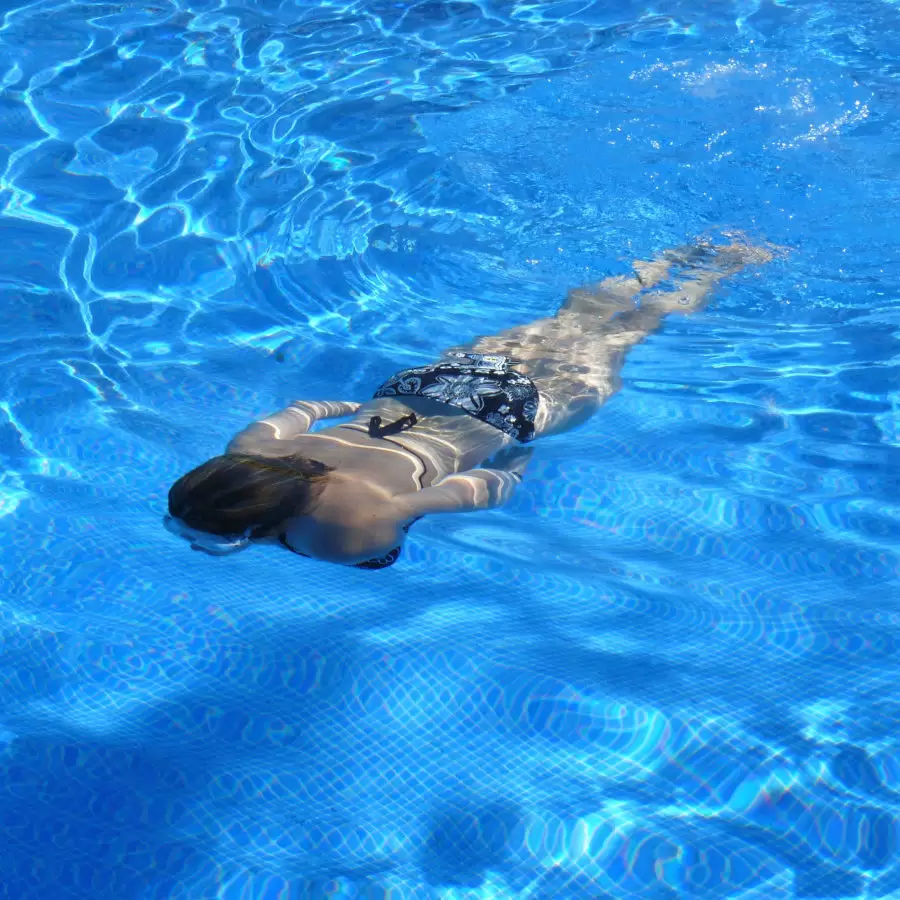Swimming pool with chlorinated or ozonated water? Importance for beauty and health
Do you know why chlorine is used in swimming pools at all? The water must be systematically filtered and purified, because each person using the pool is a source of a certain amount of pollution. It receives microorganisms, i.e. fungi, bacteria and viruses. Any cosmetics applied just before visiting the pool that remain on the surface of the skin are washed away by the water in which we swim. This is one of the reasons why it is recommended to take a shower before entering the swimming pool. Chlorine is a widely used disinfectant and is the best form of protection against harmful microbes. Pools with ozonated water are very popular, but there is also chlorine in it. The difference is that the water is pre-treated with ozone and then chlorine is added, but kept to a minimum. As a result, the specific smell of the chemical compound disappears. However, there is no reason to give up chlorinated pools as the chlorine level is safe. However, it is worth paying attention to a delicate issue - you cannot take care of physiological needs in water, but it does not mean that no one does it. Some people think chlorine destroys everything, but scientists have found that urea in the urine reacts with chlorine to form nitrogen trichloride, or trichloramine. It is responsible for the intense fragrance at the pool and irritation to the eyes and upper respiratory tract, not the chlorine itself.
Are you afraid that swimming in the pool will weaken your hair? Regain peace!
Regular visits to the pool weaken the condition of the hair. Chlorine penetrates deep into their structure and leaches out natural oils, therefore they become dry, dull and brittle. Sometimes your hair color fades. The scalp becomes dry and prone to flaking. Don't worry too much though, as there are simple ways to protect your hair. We know that a hat is a more beautiful headdress than a cap, but it is the cap that stands in the first line of defense. It prevents the hair from getting wet. It is best to fasten longer strands and place them in the center of the head - then putting on a cap will not be difficult. If you do not intend to submerge under water, choose a canvas cap that provides adequate breathability and protects against overheating. On the other hand, diving enthusiasts should use a silicone cap that easily adapts to the shape of the head and adheres to it. Latex and rubber versions wear out quickly and, in addition, they tear your hair, so it is not worth considering them. Currently women's swimwear it is easy to combine with caps according to your preferences regarding design and colors, so you do not have to worry that by wearing a hat you will lose your unique style.
Many beauty blogs have information on using conditioners and oils before putting on a shower cap, but is that really a good idea? You do not have a XNUMX% guarantee that a lock of hair will not squeeze or water will not pour under the cap, and in such a situation, cosmetics will contaminate the water in which you also dip your eyes and in which other people bathe. Remember that in the pool, everything on you ends up in the water! But don't forget to wash your hair after bathing. Use a gentle shampoo, preferably without sodium laureth sulfate (SLS) and conditioner. It is only at home that you should treat yourself to an intensive one regeneration in the form of a mask or coconut, argan or other oil with moisturizing, rebuilding and nourishing properties. Make sure to dry your hair thoroughly as soon as you leave the water and rinse your hair. If you are afraid that the warm air will destroy them, protect the ends with a mist or heat protection serum. First, carefully squeeze your hair with a towel to allow it to absorb as much moisture as possible. This will shorten the drying time.
Do you have irritated eyes after a bath? There is a way
Red, burning, irritated eyes turn the pleasure of swimming into irritation. Use glasses for comfort. This is the only correct solution, especially if you like to swim underwater with your eyes open. Choose glasses with an anti-fog coating, and you won't have to wipe them every now and then.If you feel your eyes burning after leaving the pool, wash them. It's best to have some saline with you, as plain water can further irritate the conjunctiva. Do not rub your eyes with your hands. Always take moisturizing eye drops with you. They effectively relieve unpleasant symptoms. You can buy them without any problems at a pharmacy or drugstore. Apply 1-2 drops to each eye. Repeat the action after a few hours. If the symptoms persist, see an ophthalmologist. The cause of the irritation may be allergy to chlorine.
Comfort in every situation - how to take care of your skin when you like to swim
You probably guess that applying a lotion or lotion to the body before entering the swimming pool works similarly to hair conditioners. The cosmetics are rinsed with water in which everyone bathes. This is not the way to take care of your beauty. Unfortunately, chlorinated water destroys the epidermal lipid barrier, i.e. the natural protective coat that protects it against harmful external factors. After leaving the pool, take a shower using a gel with moisturizing and lubricating oils or a cleansing cosmetic with a creamy texture that is packed with nourishing substances. Dry yourself thoroughly, then use a lotion or body butter. Butter contains natural ingredients that intensively moisturize and stimulate the renewal of epidermal cells. It is worth choosing cosmetics that contain aloe, as well as vitamins A and E and provitamin B5, i.e. pantothenic acid. Active ingredients ensure long-lasting hydration and intensive regeneration.
Pool to your health! How to reduce the risk of infection
You already know that urine reacts with chlorine, but the fact is, it may take some time for the chlorine to destroy the bacteria or other microorganisms. Escherichia coli bacteria, which cause diarrhea, die only after a minute, but it takes as long as 10 days before the destruction of, for example, a protozoan responsible for the same ailment, takes place. That is why it is important to come to the swimming pool healthy and take care of hygiene. One of the most common pool problems is athlete's foot. Avoiding the problem is quite simple - come in flip-flops! After bathing, wash and dry your feet thoroughly. Are you afraid that you will catch a cold when you go to the swimming pool in winter? It doesn't have to be that way. Just don't let it get cold. In the water, move, and when you no longer have the desire or strength, do not sit in it, but go out immediately, cover yourself with a towel and dry yourself as soon as possible, then change your clothes. We know sometimes it is a pity to pull off a perfectly fit bathing suit 2020but when you sit wet it is also the easiest route to bladder infections and bacterial or yeast inflammation of the vagina or vulva. Cranberry juice and any supplements that contain it are great for bacterial urinary tract infections. In order to avoid intimate infections, it is worth systematically using gynecological probiotics orally. They contain lactic acid sticks, which rebuild the physiological microflora of the vagina. Unfortunately, the pool may contain chlamydia and trichomoniasis, so if you notice vaginal discharge or feel discomfort in the intimate area, go to the gynecologist for your own peace of mind. Serious infections are rare, so follow these advice and enjoy swimming.







